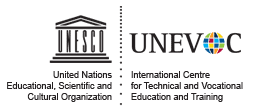UNESCO-UNEVOC at the TVET Forum for Latin America in Montevideo, Uruguay
 From 23 to 25 November, 2015, an expert meeting in Montevideo, Uruguay, convened 40 technical and vocational education and training (TVET) stakeholders and ministry representatives from Latin American countries to discuss the challenges TVET faces looking towards the implementation of the recently adopted Sustainable Development Goals
From 23 to 25 November, 2015, an expert meeting in Montevideo, Uruguay, convened 40 technical and vocational education and training (TVET) stakeholders and ministry representatives from Latin American countries to discuss the challenges TVET faces looking towards the implementation of the recently adopted Sustainable Development GoalsOrganised by UNESCO’s Regional Bureau of Education for Latin America and the Caribbean (LAC), the Regional Bureau of Science for LAC, UNESCO-UNEVOC and UNESCO HQ, the expert meeting deliberated UNESCO’s current and forthcoming TVET strategies, discussed the specific challenges facing the LAC region, and shared promising practises and roads forward. Katerina Ananiadou, Programme Specialist at UNESCO-UNEVOC, attended sessions which tackled pertinent issues including, the role of Science, Technology, Engineering and Mathematics (STEM) in TVET, skills for the informal economy, curriculum reform, Greening TVET and teacher and trainer development. The meeting provided an opportunity to present UNESCO-UNEVOC’s work in thematic areas such as Greening TVET and youth and skills. One of the key outputs of the expert meeting was, with UNESCO’s support, the development of a roadmap for a regional common plan of work for the next two years.
The meeting was also attended by the following UNEVOC Centres, in addition to the Ministries of Education present that are members of the Network:
- Federal University of Technology - Paraná (UTFPR), Brazil
- National Institute of Apprenticeship (INA), Costa Rica
- National College of Technical Professional Education (CONALEP), Mexico
- Fundación Paraguaya, Paraguay
- National Education and Work programme – Educational Centers of Capacitation and Production (PNET-CECAP), Uruguay
- UNESCO’s Regional Bureau of Education for Latin America and the Caribbean press release
 (in Spanish)
(in Spanish)
